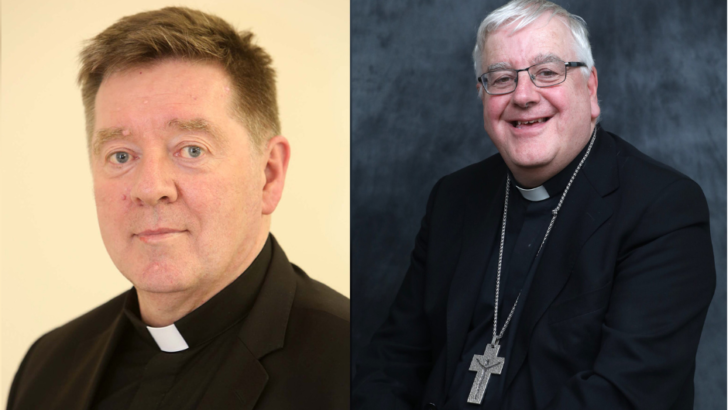It is not a surprise the number of active priests has been dropping drastically in the past decades. This issue can be seen in every diocese throughout the country, and a five-minute talk with any bishop or priest about the matter would leave you astonished.
The August 15 issue of The Irish Catholic mentioned the worrying situation of the Kilmore diocese, that sparked the necessity to understand if a similar problem is happening in other dioceses. The Irish Catholic talked with Bishop of Ardagh and Clonmacnois Paul Connell.
Currently, Ardagh and Clonmacnois Diocese has 45 active priests working in its 41 parishes, of those four are foreign: “41 priests are Irish, three Nigerian and one is Indian”, Fr Tom Healy, secretary of the diocese said. He also explained the diocese had 18 retirements in the past ten years and only one ordination in the same period.
About those stats, Bishop Connell said he issued a pastoral letter explaining to the community the diocese’s situation in which he “reiterated what they were told in the last pastoral letter by his predecessor, Archbishop Francis Duffy of Tuam, “that there would be difficulties going forward.”
Clustered
“The parishes would have to be clustered because there is no longer an ability by the diocese to have a priest in every parish because of retirements and because we don’t have any younger priests coming on at the moment,” he said.
The bishop does not believe the solution is to bring more international priests to minister in Ireland. “We have a number of international priests assisting in Ireland and that’s very helpful but it’s not a solution to the problems of the Irish Church”, he said.
Many of these international priests came from Africa to Ireland to study in Maynooth. Bishop Connell explained that “while they’re doing that, they’re helping out in parishes and assisting us, which we very much appreciate.”
He said that “in some cases, some [Irish] dioceses have made an arrangement with some dioceses in Africa to get some priests on loan for a certain amount of time.” But “we always have to be conscious of the fact, as Cardinal Tagle mentioned when he was asked about this, that as tight as things are in Europe, there still is a very much larger ratio of people without a priest in Africa.
There’s no intention of any of us to go down the road of abolishing parishes or anything like that, but we’re going to have more cooperation between parishes”
“We can’t be taking priests from other parts of the world where there is a greater need.” For the bishop, it is fine to have some priests coming seeking further education and assisting parishes while they are here.
Seeing the numbers of active priests going down every year and not enough ordinations and incardinations to balance those numbers, one might think the solution is to close or merge parishes. However, Bishop Connell was very incisive saying that “is not an option.”
“There’s no intention of any of us to go down the road of abolishing parishes or anything like that, but we’re going to have more cooperation between parishes”, he explained.
The diocese’s plan to counter the dropping number of priests is to involve laity workers. The bishop said the diocese, from now on, will “have much more involvement of lay people as catechists, as pastoral workers, as secretaries, to do a lot of the administrative work. We’re going to have much more of that going forward because there will be a smaller number of priests in this crisis.”
The diocesan changes to counter the challenges of such a drop in new priests numbers have already started in that diocese. In the last year, two parishes in the Carrick-on-Shannon area were clustered with Carrick-on-Shannon.
“The four priests in that area now are looking after three parishes. Carrick-on-Shannon is a large town, so that’s a big ask for the four priests to, between them, do all of that,” the bishop said.
This summer, Bishop Connell has clustered two further parishes. “There was already a clustering arrangement happening down in Lanesborough,” he explained.
Retire
If all priests in Ardagh and Clonmacnois Diocese were to retire at 75, “if they all were to simply stop and do not go further, the number of priests left would be such that things would be very stretched. I mean, in this diocese by 2030, if that were to happen, I would probably be looking at running a diocese with only 15 priests”, Bishop Connell said.
Bishop Duffy flagged a number of years ago this crisis would happen, and Bishop Connell has been talking to his community about what has and has not changed in the diocese since the first prediction.
The crisis is still here, and the difficulties will not disappear tomorrow, but not everything is bad, and the Diocese of Ardagh and Clonmacnois is seeing small but positive progress.
There are opportunities, and perhaps if we discern what’s happening, maybe the Lord is saying something to us, [that] we need to propose change the way we do things”
“We had no seminarians, and this year we hope to have two. But that will take time to come through the system. It takes a long while to train seminarians, but it’s great. It’s a very positive development.”
Fortunately, the diocese counts on the generosity of its priests. The bishop said “they’re superb” as some agreed to continue to work for the moment. “And even when they do retire, they do help out, they assist their former colleagues in lots of ways, which is extremely appreciated and very helpful.”
It is a challenging situation for the Irish Church, the dioceses and the bishops. Bishop Connell said every diocese is trying to deal with this crisis as best as they can, and that the dioceses are unique and are finding their own particular solutions.
Crisis
Oftentimes an opportunity can be found in the middle of a crisis. The bishop believes in this challenge “there are opportunities, and perhaps if we discern what’s happening, maybe the Lord is saying something to us, [that] we need to propose change the way we do things.”
Even though the changes, the clustering and the participation of lay people in administration are necessary to manage the lack of priests, that should not be the solution. “We need to continue always to pray and to encourage vocations to the priesthood and religious life. Because without priests, there can be no Eucharist and the Eucharist is where the centre of the Church is.”


 Renata Steffens
Renata Steffens Archbishop Francis Duffy (left) and Bishop Paul Connell (right)
Archbishop Francis Duffy (left) and Bishop Paul Connell (right)
